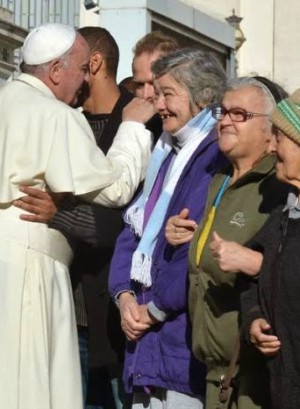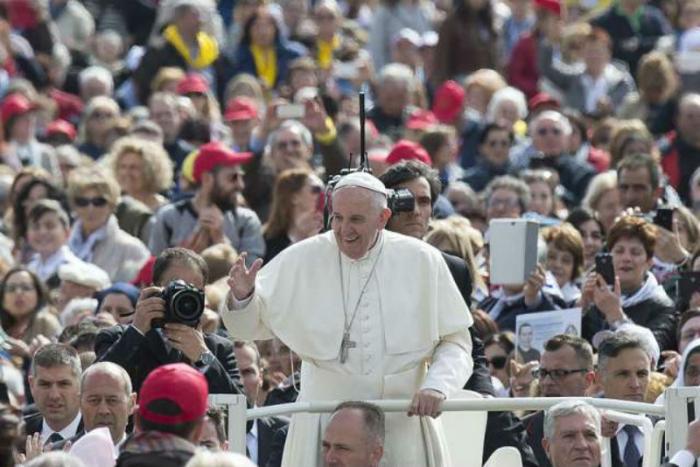
Pope Francis delivers exclusive interview with homeless-run Italian Newspaper
FREE Catholic Classes
Pope Francis gave an exclusive interview with Italian magazine Scarp de' tenis, or "Sneaker."

Pope Francis has always treated the homeless with respect.
Highlights
Catholic Online (https://www.catholic.org)
2/28/2017 (8 years ago)
Published in Living Faith
Keywords: Pope Francis, interview, homeless, Scarp de' tenis, Sneakers
LOS ANGELES, CA (Catholic Online) - Sneaker Magazine is run by a group of homeless writers, who interviewed the Pontiff on serious topics such as his decision to house Syrian refugees at the Vatican and what he has to say about the city's homeless.
Pope Francis explained his decision to house Syrian refugees has inspired other Roman parishes to do the same.
According to the Vatican, Pope Francis stated: "The Pope's appeal was heard by many people and many parishes. Many of them listened. In the Vatican there are two parishes and each of them hosted a Syrian family. Many parishes in Rome opened their doors to receive them, and I know that others, which did not have any space in the church, collected money to pay rent for people and families in need for a full year.
"The aim to be reached must be that of integration, and therefore it is important to accompany them for the initial period. In many parts of Italy much was done. The doors were opened in many Catholic schools, in convents, in many other structures. Therefore, I say that the appeal was heard. I know that many people offered money to pay rent for homeless people."
The Pontiff was then asked: "In the past, everyone wrote about the Pope's shoes, the shoes of a worker and a walker. Recently you went to a shop to buy a new pair. Why so much attention? Perhaps because today we find it so difficult to put ourselves in other people's shoes?"
The Pope responded: "It is very hard to put oneself in other people's shoes, because often we are enslaved by our own selfishness. At a first level we can say that people prefer to think about their own problems without wanting to see the suffering and difficulties of others.
"There is another level, though. Putting oneself in the shoes of others means having a great capacity for understanding, to understand the moment and difficult situations. ....If we think of the existences that are often made up of loneliness, then putting ourselves in the shoes of others means service, humility, magnanimity, which is also the expression of a need.
"I need someone to put himself in my shoes. ...How often I come across people who, after having sought comfort in a Christian, be they a layperson, a priest, a nun, a bishop, say to me, 'Yes, they listened, but they didn't understand.' Understanding means putting oneself in other people's shoes."
Another question was what is the first thing the Pontiff tells a homeless person upon meeting them?
Pope Francis simply stated, "Hello. How are you?"
He further explained: "People who live on the streets understand immediately if there is true interest on the part of the other person or when there is, I do not want to say that sentiment of compassion but certainly of suffering. It is possible to see a homeless person and look at him as a person, or as if he were a dog.
"And they are aware of this different way of looking at them. In the Vatican there is a well-known story of a homeless person, of Polish origin, who was generally found in Piazza del Risorgimento in Rome, and never spoke to anyone, not even the Caritas volunteers who brought him a hot meal in the evening. Only after a long time were they able to make him tell his story.
'"I am a priest, I know your Pope well, we studied together in the seminary.' The word reached St. John Paul II, who heard the name, confirmed that he had been with him in the seminary, and wanted to meet him. They embraced after forty years, and at the end of an audience the Pope asked to be confessed by the priest who had been his companion.
"'Now it is your turn,' said the Pope. And the companion from the seminary was confessed by the Pope. Thanks to the gesture of a volunteer, of a hot meal, a few words of comfort, a kind look, this person was able to rise again and resume a normal life that led him to become the chaplain of a hospital."
When asked how the Pontiff would respond to those begging for alms on the street, Pope Francis stated: "There are many arguments to justify oneself when you do not give alms. 'But what, I give money and then he spends it on a glass of wine?' If a glass of wine is the only happiness he has in life, that is fine. Instead, ask yourself what your do secretly.
"What 'happiness' do you seek in private? or, on the contrary to him, you are more fortunate, with a house, a wife, children, which leads you to say, 'Take care of yourselves.'
"Help is always right. Certainly, it is not a good thing just to throw a few coins at the poor. The gesture is important, helping those who ask, looking them in the eyes and touching their hands. Tossing the money without looking in the eyes, that is not the gestures of a Christian.
"Teaching in charity is not about offloading one's own sense of guilt, but it is touching, looking at our inner poverty that the Lord understands and saves. Because we all have inner poverty."

Pope Francis at the Jubilee Audience in St. Peter's Square (L'Osservatore Romano).
The Pontiff was asked what he would say to those who question whether nations "should truly welcome everyone indiscriminately, or if it is not necessary to impose limits.
Pope Francis explained refugees arriving in Europe are running from violence or the threat of starvation.
He said Europe is, in a way, to blame "because we exploit their lands but do not make any type of investment to enable them to benefit."
Continuing, the Pope stated: "They have the right to emigrate and they have the right to be received and helped. This, however, must be done with that Christian virtue which is the virtue that should be typical of governors, namely prudence.
"What does this mean? It means receiving all those who 'can' be received. And this is with regard to numbers. But it is equally important to reflect on 'how' to receive, because receiving means integrating. This is the most difficult thing, because if migrants do not integrate, they are ghettoized.
"...To integrate, then, means to enter into the life of the country, to respect the law of the country, to respect the culture of the country but also to ensure that one's own culture and one's own cultural riches are respected. Integration is a very difficult task.
"To receive, welcome, console, and immediately integrate. It is precisely integration that is missing. Every country must then see what number it is able to receive. It is not possible to receive if there is no chance of integration."
The interviewer asked: "In your family history, there is the crossing of the ocean by your grandparents, with your father. How does one grow up, as the son of migrants? Did you ever feel a little uprooted?"
Pope Francis responded: "I never felt uprooted. In Argentina we are all migrants. Therefore down there, interfaith dialogue is normal. At school there were Jews who arrived mostly from Russia, and Syrian and Lebanese Muslims, or Turks with Ottoman Empire passports. There was great brotherhood."
When asked what he missed most about Buenos Aires, the Pontiff responded: "There is only one thing I miss a lot: the opportunity to go out on the street. I like visiting parishes and meeting people. I don't have any particular nostalgia."
At the end of March, Pope Francis is expected to visit Milan, which boasts several charitable organizations, volunteer associations and places to offer the homeless food, a place to sleep, healthcare and faith.
The Pontiff was asked if these efforts are enough and what the needs of the homeless really are.
"As for migrants, very simply, these people are in need of the same thing: that is, integration," Pope Francis said. "Certainly, it is not simple to integrate a homeless person, because each one has a particular story. Therefore, we must approach each one, find the way to help them and to lend them a hand."
The Pope was told he often speaks highly of the poor and claims they can change the world, but were poverty and misery exists, how can they stand together in solidarity?
"Here too I offer my experience in Buenos Aires," Pope Francis stated. "In the slums there is more solidarity than in the city center quarters. In the slums there are many problems, but often the poor are more united among themselves,because they are aware they need each other.
"I have found more selfishness in other quarters, I would not say wealthier because that would be to qualify by disqualifying, but the solidarity we see in poorer neighborhoods an in the slums is not found in other areas, even if their life is more complicated and difficult.
"In the slums, for example, drug use is more visible, but only because in other quarters it is more covert, it is done wearing 'white gloves.'"
The interviewer described a published guide of the city of Milan from the point of view of the homeless. This offers a unique view of Milan, but what does Pope Francis know of Milan and what does he expect from it when he visits?
"I do not know Milan," Pope Francis admitted. "I have been there only once, for a few hours, in the distant 1970s. ...But I strongly wish to do so; I hope to meet many people. This is my greatest expectation: yes, I hope to meet a lot of people."
---
'Help Give every Student and Teacher FREE resources for a world-class Moral Catholic Education'
Copyright 2021 - Distributed by Catholic Online
Join the Movement
When you sign up below, you don't just join an email list - you're joining an entire movement for Free world class Catholic education.
- Advent / Christmas
- 7 Morning Prayers
- Mysteries of the Rosary
- Litany of the Bl. Virgin Mary
- Popular Saints
- Popular Prayers
- Female Saints
- Saint Feast Days by Month
- Stations of the Cross
- St. Francis of Assisi
- St. Michael the Archangel
- The Apostles' Creed
- Unfailing Prayer to St. Anthony
- Pray the Rosary
![]()
Copyright 2025 Catholic Online. All materials contained on this site, whether written, audible or visual are the exclusive property of Catholic Online and are protected under U.S. and International copyright laws, © Copyright 2025 Catholic Online. Any unauthorized use, without prior written consent of Catholic Online is strictly forbidden and prohibited.
Catholic Online is a Project of Your Catholic Voice Foundation, a Not-for-Profit Corporation. Your Catholic Voice Foundation has been granted a recognition of tax exemption under Section 501(c)(3) of the Internal Revenue Code. Federal Tax Identification Number: 81-0596847. Your gift is tax-deductible as allowed by law.










